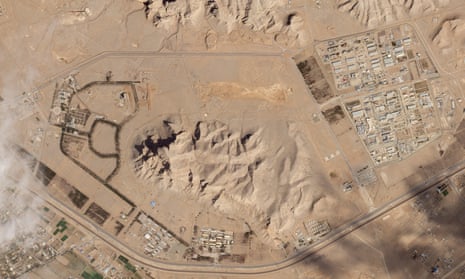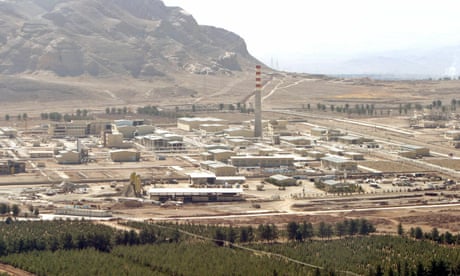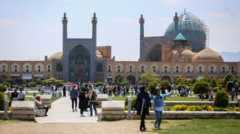1). “Middle East crisis live: No plan for immediate retaliation against Israel, senior Iranian official says after blasts reported near Isfahan”, Apr 19, 2024, Vivian Ho (now), Amy Sedghi and Reged Ahmad (earlier), The Guardian, at < https://www.theguardian.com/
2). “Israel has mounted airstrikes on Iran, US confirms, as Tehran plays down attack: Iranian official indicates no ‘immediate’ plan for retaliation after explosions reported in sky over Isfahan and Tabriz”, Apr 19, 2024, Peter Beaumont in Jerusalem and Julian Borger in Washington, The Guardian, at < https://www.theguardian.com/
3). “US calls for calm after officials say Israeli missile strikes Iran: Now playing video Israeli Missile Strikes Iran, US says from BBC News: Israeli Missile Strikes Iran, US says”, Live, Apr 19, 2024, Barbara Tasch, James Harness & Sophie Abdulla, BBC News, at < https://www.bbc.com/news/live/
4). “Global South Takes Israel to Court, While West Targets Those Who Say ‘Free Palestine’ ”, Apr 18, 2024, Eugene Puryear interviews Sevim Dağdelen (leftist member of the Bundestag), and Jodi Dean (a professor, prominent political theorist, and author, has been suspended from her teaching duties at Hobart and William Smith Colleges over the essay she wrote in support of Palestinian liberation ), BreakThrough News, at < https://www.youtube.com/
~~ recommended by dmorista ~~
Introduction by dmorista: The U.S. continues to stagger through the increasing series of both domestic and overseas crises that have come to characterize this waning phase of U.S. global dominance. Israel has now made at least their preliminary reprisal attack on Iran, in the most recent series of incidents (Israel bombed the Iranian consulate in Baghdad killing 7 high and medium level military commanders, Iran responded with a fairly restrained set of drone attacks with 300 drones almost all of which were shot down, now Israel has launched its own mild set of bombs, also drone launched??, and now the Iranians say they will not respond as damage was minimal). Reports from the Center-Left publication The Guardian are found in Items 1)., “Middle East crisis live: ….”, and Item 2)., “Israel has mounted airstrikes on Iran, ….”, present a mix of short reports from places in the Middle East and from the West. Anthony Blinken, the current U.S. Secretary of State and long-time Zionist Lobbyist, was the subject of several reports. Interestingly Down near the bottom of Item 1)., there is a photo of protesters battling police near the dock where the various high officials of the G-7 were embarking on boats to go out to enjoy a luxurious meeting on the Isle of Capri.
U.S. Strategic Dilemmas Map
Item 3)., “ US calls for calm ….”, presents the totally status quo western power position. It has even more laudatory reports on Anthony Blinken than The Guardian article did.
For a different point of view Item 4)., “Global South Takes Israel to Court, ….” the leftist news broadcast BreakThrough News, interviews a couple of women who are both dissenters from the standard knee-jerk support of Israel found among the rulers and their minions in the U.S. and Europe.
xxxxxxxxxxxxxxxxxxxxxxxxx
Israel has mounted airstrikes on Iran, US confirms, as Tehran plays down attack

Iranian official indicates no ‘immediate’ plan for retaliation after explosions reported in sky over Isfahan and Tabriz
US officials have confirmed that Israel has carried out airstrikes against Iran, as explosions were reported in the sky over the cities of Isfahan and Tabriz, while the Iranian government sought to play down the scale of the attack.
According to Italy’s foreign minister, Antonio Tajani, speaking later on Friday, the US told the G7 foreign ministers meeting in Capri that it had received “last minute” information from Israel about a drone action in Iran.
As an Iranian official indicated that it had no “immediate” plan for retaliation, calls mounted internationally – including from the European Commission president, Ursula von der Leyen – for Israel and Iran to de-escalate their confrontation, a call amplified by a joint G7 communique.
Accounts suggested that at least three explosions occurred in the air above the central Iranian city of Isfahan, which holds facilities for the country’s nuclear programme, weapons factories and a major airbase.
According to Iranian state TV, shortly after midnight, “three drones were observed in the sky over Isfahan. The air defence system became active and destroyed these drones in the sky”.
Travellers at the city’s airport and elsewhere reported hearing several loud booms, as the air defence batteries opened fire on what were described by officials as “suspicious objects”.
Speaking publicly at the G7 meeting in Capri, the US secretary of state, Antony Blinken, declined to elaborate except to say his country had not been involved. “I’m not going to speak to that except to say that the United States has not been involved in any offensive operations,” Blinken said.
The UN secretary general, António Guterres, in his own intervention, said it was “high time to stop the dangerous cycle of retaliation in the Middle East”.

An Iranian official told the New York Times that his country believed the attack was carried out with small drones, possibly launched inside Iran. Previous attacks inside Iran have been attributed to Israel, including a drone strike also on a weapons factory in Isfahan in January 2023.
While Israeli officials declined to comment publicly, several quoted off the record suggested that Israel was behind the attack, which was reportedly designed to demonstrate that it could strike deep within Iran.
Iranian state media said drones had been shot down over Isfahan province in the early hours, and showed live shots of morning traffic in Isfahan city after sunrise to show that the situation was calm.
The apparent attack came less than a week after Iran fired more than 300 missiles and drones at Israel in response to an Israeli strike on an Iranian diplomatic compound in Syria that killed seven Iranian officials on 1 April.
Since those Iranian strikes, largely unsuccessful, Israel has been weighing its response amid strong pressure from the US and other western supporters to avoid a further dangerous escalation in the tit-for-tat attacks.
Israel’s N12 news channel reported that Israel had also struck targets in Iraq and Syria, and explosions were reported in both those countries.
Internal Iranian flights were cancelled, passengers at Tehran’s Imam Khomeini airports were told to leave the building, and detonations were also reported in the sky over Tabriz.
Iranian state media sought to reassure Iranians on Friday morning that the country did not face a major threat.
The Revolutionary Guards (IRGC) suggested that the aerial incursions had involved mini-drones. A reporter for the Tasnim news agency, closely affiliated to the IRGC, broadcast a video at dawn, showing the time on his watch, saying he was outside a nuclear site in Isfahan province which was “completely safe”.
Siavosh Mihandoust, a senior commander in Iran’s army, was reported by state TV as saying there was no damage in Isfahan.
France, Italy and Oman were quick to call for de-escalation. The Italian foreign minister, Antonio Tajani, urged an “absolute de-escalation”, saying his G7 counterparts would discuss it at talks in Capri.
“We invite everyone to be cautious to avoid an escalation,” he told Rai news from the Italian island, which is hosting a meeting between foreign ministers of the G7 nations.
The G7, which includes the UK, US, France, Germany, Japan and Canada, wanted an “absolute de-escalation” in the Middle East, he said.
“We are monitoring the situation closely. We will address the situation with the foreign ministers at the G7 session this morning in Italy,” the Canadian foreign minister, Mélanie Joly, tweeted.
Officials from the Biden administration said Israel had informed Washington earlier on Thursday that a strike was coming in the next 24 to 48 hours, at a virtual session of the US-Israeli Strategic Consultative Group involving the US national security adviser, Jake Sullivan, and his Israeli counterpart, Tzachi Hanegbi, as well as the Israeli minister for strategic affairs, Ron Dermer. According to CNN, the Israelis assured the Americans that Iran’s nuclear facilities would not be targeted.

The Israeli strike was in retaliation for an Iranian aerial attack involving about 300 missiles and drones on Sunday morning, which in turn was a reprisal for the bombing of an Iranian consular building in Damascus, Syria on 1 April. After the Iranian attack, Joe Biden had urged the Israeli prime minister, Benjamin Netanyahu, not to respond militarily but to the “take the win” of having shot down almost all the incoming Iranian munitions. Friday morning’s strike, whatever its scale, was an act of defiance of US influence.
Netanyahu, in particular, has long been a hawk on Iran, having threatened Israeli strikes on the country in the past, and has been under pressure from far-right coalition partners to mount a robust response.
With the scale of the retaliation so far extremely limited, the far-right Israeli national security minister, Itamar Ben-Gvir, condemned the response on X as “Feeble!”
The US priority is to prevent the seven-month Gaza conflict from expanding into a broad regional conflict, and it made clear to Israel that while it had helped it to defend itself against Iranian attack, it would not participate in any form of military counter-strike. US officials insisted they had no part in Israel’s actions overnight.
Before Friday’s strike, Iran’s foreign minister, Hossein Amir-Abdollahian, told CNN on Thursday that Iran would respond forcefully if Israel attacked again.
“If the Israeli regime commits the great error once again, our response will be decisive, definitive and regretful for them,” Amir-Abdollahian said. He described Sunday’s aerial attack on Israel as “our minimum response”, but if there was another Israeli strike Iran would respond “at a maximum level”.
srael has mounted airstrikes on Iran, US confirms, as Tehran plays down attack

Iranian official indicates no ‘immediate’ plan for retaliation after explosions reported in sky over Isfahan and Tabriz
US officials have confirmed that Israel has carried out airstrikes against Iran, as explosions were reported in the sky over the cities of Isfahan and Tabriz, while the Iranian government sought to play down the scale of the attack.
According to Italy’s foreign minister, Antonio Tajani, speaking later on Friday, the US told the G7 foreign ministers meeting in Capri that it had received “last minute” information from Israel about a drone action in Iran.
As an Iranian official indicated that it had no “immediate” plan for retaliation, calls mounted internationally – including from the European Commission president, Ursula von der Leyen – for Israel and Iran to de-escalate their confrontation, a call amplified by a joint G7 communique.
Accounts suggested that at least three explosions occurred in the air above the central Iranian city of Isfahan, which holds facilities for the country’s nuclear programme, weapons factories and a major airbase.
According to Iranian state TV, shortly after midnight, “three drones were observed in the sky over Isfahan. The air defence system became active and destroyed these drones in the sky”.
Travellers at the city’s airport and elsewhere reported hearing several loud booms, as the air defence batteries opened fire on what were described by officials as “suspicious objects”.
Speaking publicly at the G7 meeting in Capri, the US secretary of state, Antony Blinken, declined to elaborate except to say his country had not been involved. “I’m not going to speak to that except to say that the United States has not been involved in any offensive operations,” Blinken said.
The UN secretary general, António Guterres, in his own intervention, said it was “high time to stop the dangerous cycle of retaliation in the Middle East”.

An Iranian official told the New York Times that his country believed the attack was carried out with small drones, possibly launched inside Iran. Previous attacks inside Iran have been attributed to Israel, including a drone strike also on a weapons factory in Isfahan in January 2023.
While Israeli officials declined to comment publicly, several quoted off the record suggested that Israel was behind the attack, which was reportedly designed to demonstrate that it could strike deep within Iran.
Iranian state media said drones had been shot down over Isfahan province in the early hours, and showed live shots of morning traffic in Isfahan city after sunrise to show that the situation was calm.
The apparent attack came less than a week after Iran fired more than 300 missiles and drones at Israel in response to an Israeli strike on an Iranian diplomatic compound in Syria that killed seven Iranian officials on 1 April.
Since those Iranian strikes, largely unsuccessful, Israel has been weighing its response amid strong pressure from the US and other western supporters to avoid a further dangerous escalation in the tit-for-tat attacks.
Israel’s N12 news channel reported that Israel had also struck targets in Iraq and Syria, and explosions were reported in both those countries.
Internal Iranian flights were cancelled, passengers at Tehran’s Imam Khomeini airports were told to leave the building, and detonations were also reported in the sky over Tabriz.
Iranian state media sought to reassure Iranians on Friday morning that the country did not face a major threat.
The Revolutionary Guards (IRGC) suggested that the aerial incursions had involved mini-drones. A reporter for the Tasnim news agency, closely affiliated to the IRGC, broadcast a video at dawn, showing the time on his watch, saying he was outside a nuclear site in Isfahan province which was “completely safe”.
Siavosh Mihandoust, a senior commander in Iran’s army, was reported by state TV as saying there was no damage in Isfahan.
France, Italy and Oman were quick to call for de-escalation. The Italian foreign minister, Antonio Tajani, urged an “absolute de-escalation”, saying his G7 counterparts would discuss it at talks in Capri.
“We invite everyone to be cautious to avoid an escalation,” he told Rai news from the Italian island, which is hosting a meeting between foreign ministers of the G7 nations.
The G7, which includes the UK, US, France, Germany, Japan and Canada, wanted an “absolute de-escalation” in the Middle East, he said.
“We are monitoring the situation closely. We will address the situation with the foreign ministers at the G7 session this morning in Italy,” the Canadian foreign minister, Mélanie Joly, tweeted.
Officials from the Biden administration said Israel had informed Washington earlier on Thursday that a strike was coming in the next 24 to 48 hours, at a virtual session of the US-Israeli Strategic Consultative Group involving the US national security adviser, Jake Sullivan, and his Israeli counterpart, Tzachi Hanegbi, as well as the Israeli minister for strategic affairs, Ron Dermer. According to CNN, the Israelis assured the Americans that Iran’s nuclear facilities would not be targeted.

The Israeli strike was in retaliation for an Iranian aerial attack involving about 300 missiles and drones on Sunday morning, which in turn was a reprisal for the bombing of an Iranian consular building in Damascus, Syria on 1 April. After the Iranian attack, Joe Biden had urged the Israeli prime minister, Benjamin Netanyahu, not to respond militarily but to the “take the win” of having shot down almost all the incoming Iranian munitions. Friday morning’s strike, whatever its scale, was an act of defiance of US influence.
Netanyahu, in particular, has long been a hawk on Iran, having threatened Israeli strikes on the country in the past, and has been under pressure from far-right coalition partners to mount a robust response.
With the scale of the retaliation so far extremely limited, the far-right Israeli national security minister, Itamar Ben-Gvir, condemned the response on X as “Feeble!”
The US priority is to prevent the seven-month Gaza conflict from expanding into a broad regional conflict, and it made clear to Israel that while it had helped it to defend itself against Iranian attack, it would not participate in any form of military counter-strike. US officials insisted they had no part in Israel’s actions overnight.
Before Friday’s strike, Iran’s foreign minister, Hossein Amir-Abdollahian, told CNN on Thursday that Iran would respond forcefully if Israel attacked again.
“If the Israeli regime commits the great error once again, our response will be decisive, definitive and regretful for them,” Amir-Abdollahian said. He described Sunday’s aerial attack on Israel as “our minimum response”, but if there was another Israeli strike Iran would respond “at a maximum level”.
xxxxxxxxxxxxxxxxxxxxxxxxxxxxxxxxxxx
For now, there’s a sigh of relief, a pause.
Israel’s limited strike, not officially acknowledged, has given space to Tehran. In this grey area, its leaders are casting it as a slap so weak it’s not even clear who did it. They don’t lose face after days of declarations vowing that even the tiniest Israeli invasion would provoke an immediate and harsh response.
Many had predicted Israel would wait until after Passover to retaliate. It appears to have decided it needed to hit sooner, to send a clear signal, just before the holiday starts. It may still strike again, in a different place, with different force, when this period ends.
But as my colleague Jeremy Bowen writes, this crisis really illustrates how badly Iran and Israel understand each other.
This may have been just a warning salvo into the beating heart of Iran, the province of Isfahan with its stunning Islamic architecture but also a nuclear facility, a major air base, the industrial heartland including drone and ballistic missile factories.
This round may be over, for now, but the seething hostility between two regional rivals is not.
xxxxxxxxxxxxxxxxxxxxxxxxxxxxxxxxx


No comments:
Post a Comment